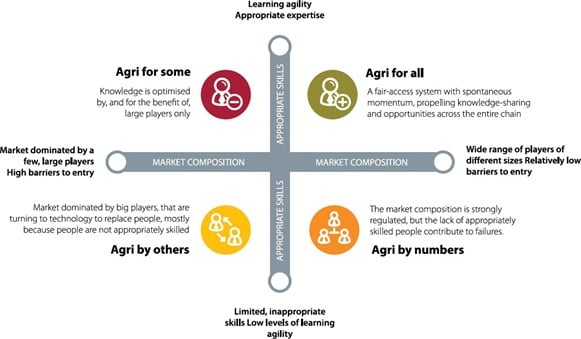Futures of agricultural employment in South Africa 2035
The services of the Institute for Futures Research (IFR) at Stellenbosch Business School were retained to explore the futures of work in the agricultural sector of South Africa. This was a comprehensive project, spanning over 10 months and involving several stakeholders, including government, industry, and interest groups.
Importance of the study
Agbiz, Agri SA and other role players in the agricultural value chain participated in the study and provided inputs into the scenario-planning exercise. Agricultural value chains are vital to the South African economy not just within the context of food security, but also to drive economic growth and employment. The President’s Economic Recovery Plan places a great deal of emphasis on the agricultural sector as it is a sector that performed relatively well despite the economic downturn that accompanied the Covid-19 pandemic.
Even before Covid, the global movement towards a ‘just transition to a lower carbon economy created the expectation that the economy of the future will be driven by green sectors.
Within the South African context, a quarter of our country’s employment is derived from carbon-intensive industries. Agriculture and tourism are seen as the two primary sectors that will need to create employment as opportunities in carbon-intensive sectors decline over time. This places significant pressure on the agricultural sector and it is important to understand the type and scope of jobs that will be required by the sector as we enter the fourth industrial revolution. To remain internationally competitive, the sector has embraced technology, automation and big data to improve efficiencies. This will have a direct impact on the labour market and the demand for skills.
This study therefore comes at a critical time as it looks ahead and it is important that the sector both contributes to this work as well as use it for long-term planning.
Scope of the study
To formulate a robust and multi-faceted futures perspective, the IFR employed a selection of futures methodologies to analyse and crystallise this problem, to construct alternative scenarios of agricultural employment for South Africa toward 2035.
The two pivotal uncertainties are:
- The composition of the market: The extent to which there is a balance between mega, small and subsistence farmers and other enterprises within the agri
- Appropriate skills: The extent to which potential and current participants possess relevant knowledge and proven abilities. It also includes the extent to which knowledge transfer is appropriate and successful.
The pivotal uncertainties were used to construct a set of
four scenarios:
Agriculture skills for the futurecould be categorised as follows:
- Soft skills: collaboration/teamwork, communication, customer service, business principles, and
- Systems thinking (design thinking, critical thinking, exponential thinking, process, project management, problem solving).
- Technology integration (low tech and high tech, engineering and analysis).
- Data management (storage, analysis, collection, security).
- Basic natural sciences (soil, biology, plant, animal).
Further to the prioritisation of systems thinking, it is proposed that the field of meso- economics constitutes a critical future skill for government and business in agriculture. Meso-economics refers to the middle ground between micro and macro-economics, i.e., how micro-economic intervention translates into macro-economic results.
While technology is depressing the number of on-farm jobs being created in agriculture, it is creating new opportunities that are also not as closely tied to the use of agricultural land (or as climate dependent). Both of these aspects may enable easier (and faster) gains than has been the case to date in land-based agricultural reform, provided a coherent and strategic approach can be adopted to develop the opportunities.
Agricultural expansion in South Africa has often been limited by weak inter-economic
linkages. Reviewing the country’s agricultural linkages and infrastructure, identifying gaps that are limiting expansion and targeting specific initiatives to address these, may be low- hanging fruit that can unlock many more jobs that require somewhat more skilled employees (and which is also more likely to appeal to the unemployed youth).
Job creation will need to be supported by educational initiatives to address the skills shortage and to ensure the necessary support structures and capabilities are in place. Ensuring all these capabilities are suitably integrated will be key to building a sustainable agricultural sector that can deliver on the job creation needs of South Africa’s growing population. By broadening agricultural strategies and plans to include new areas and ventures, the country could also enhance the resilience of its agricultural sector and further diversify its approach to ensuring food security.
Five mini-scenarios
add richness to the report, and may help users to ‘see’ potential
futures:
- How aquaculture became a sector leader in South African agriculture
- Urban farmers taking the lead
- Land philosophy – how efficient usage finally trumped the political agenda
- How agri became cool
- Filling the missing middle
Download the report here.
Enquiries:
IFR
Doris Viljoen, Director: Institute for Futures Research, Stellenbosch Business School | 021 918 4156 | [email protected]
Agbiz
Theo Boshoff, Agbiz CEO
076 951 4269 | [email protected]
Subscribe
Want to stay in touch with the Stellenbosch Business School community? Sign up and receive newsletters from our desk to your inbox.
SIGN UP

